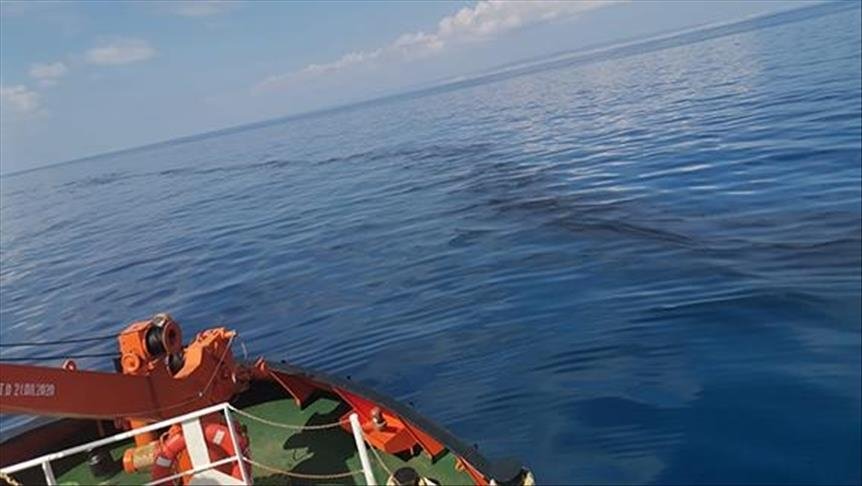ANKARA
Turkey’s vice president said Friday that pollution in the Mediterranean Sea caused by an oil leak from Syria is now only on the surface and carried no risk to Cyprus.
Fuat Oktay and held a news conference alongside Turkish Cypriot President Ersin Tatar at the presidential complex in the Turkish capital, Ankara, where he said the spill began with a leak of fuel from a storage tank at a power plant near a refinery in the Baniyas region of Syria, recalling that Turkey also took immediate measures against the risk of oil hitting the shores in Cyprus.
“There were three marine vessels in Cyprus, and Turkey sent eight more, including trailers,” said Oktay, adding that the risk is gone for the moment.
“The view we see there is that pollution is now on the surface. Ee see that there is no pollution left to a very large extent, more piecemeal,” he said.
Referring to disasters that Turkey has faced lately, he noted that Ankara is pleased with the help and support received by the Turkish Republic of Northern Cyprus (TRNC) in the fight against such tragedies.
“Our mobilization to search for our losses with all decency continues. Now, we have entered a period of intense healing of our wounds,” he said.
“All of the buildings will be rebuilt and delivered no later than one year,” he said, mentioning that Turkey has to be more prepared for such incidents from now on.
Additionally, he talked about the current situation in Maras, Cyprus.
Underlining that the TRNC has a right to open the “ghost town” to the public, Oktay said that Turkey has always supported the Turkish Cypriots and that will continue.
“Greek Cypriots aim to increase the tension,” he said, noting that neither Turkey nor the TRNC will remain with their hands tied toward the issue.
– Decades-long dispute
Cyprus has been mired in a decades-long dispute between Greek and Turkish Cypriots, despite a series of diplomatic efforts by the UN to achieve a comprehensive settlement.
Ethnic attacks starting in the early 1960s forced Turkish Cypriots to withdraw into enclaves for their safety.
In 1974, a Greek Cypriot coup aimed at Greece’s annexation led to Turkey’s military intervention as a guarantor power to protect Turkish Cypriots from persecution and violence. As a result, the TRNC was founded in 1983.
It has seen an on-and-off peace process in recent years, including a failed 2017 initiative in Switzerland under the auspices of guarantor countries Turkey, Greece and the UK.
The Greek Cypriot administration entered the European Union in 2004, the same year Greek Cypriots thwarted a UN plan to end the longstanding dispute.
A UN-led unofficial Cyprus conference was held in Geneva in April to seek common ground to negotiate a lasting solution to the decades-old conflict.
Turkey, Greece and the UK also took part in the meeting.
Tatar said his country will also be holding bilateral meetings in September in New York, expressing its view on the Cyprus issue.
“I don’t think that the two sides can reach a consensus on sovereign equality and the search for common ground has not achieved results at the moment. Still, we will be in New York and we will continue our contacts,” he said.










Discussion about this post